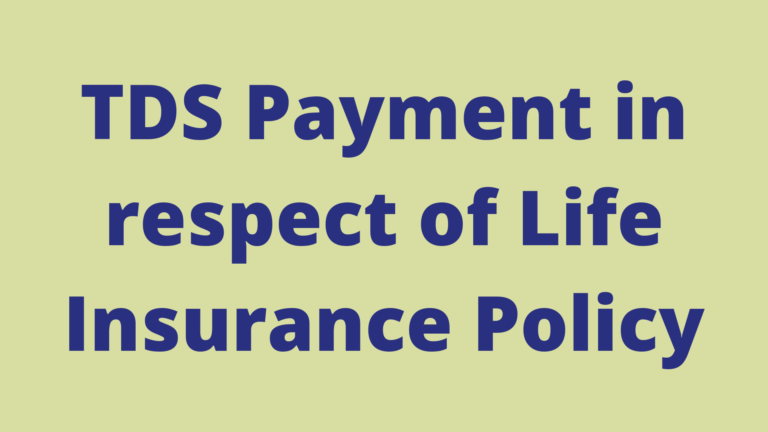
TDS payment in respect of life insurance policy
As per current provisions, any payment in respect of life insurance policy to a resident person shall be subject to TDS at the rate of 1% under Section 194DA. The tax shall be deducted under this provision at the time of payment, if sum payable exceeds Rs. 1 lakh. Tax is not required to be deducted if amount payable under an insurance policy is exempt from tax under Section 10(10D) or the sum is received on the occasion of death of the insured person.
An amendment has been proposed under this section as taxpayers were facing hardships due to deduction of tax from the gross amount whereas they were liable to pay tax only on net income. Generally, in Chapter XVII tax is required to be deducted on the amount paid or payable and not on the income component except in Section 192 and Section 195. The Finance Bill has proposed an amendment to Section 194DA which requires the deductor to deduct tax only on the income com-ponent comprised in the insurance pay-out. This amendment has been proposed so that the income as per TDS return of the deductor can be matched automatically with the return of income filed by the assessee. The tax shall be deducted at the rate of 5% computed on the income component (in contrast to 1% on the gross amount).
The provisions of Section 194DA does not prescribe any mechanism for computation of taxable in-come in case of insurance proceeds. When an insurer takes the insurance policy, he gets the right to receive sum due against his insurance policy either on maturity or on its surrender. Therefore, right to receive sum from insurance policy is a capital asset within the meaning of section 2(14) and any income or losses arising on its transfer shall be chargeable to tax under the head ‘Capital Gains’. If an insurance policy has been held for more than 36 months, it shall be considered as long-term capital assets, accordingly the benefit of cost inflation index shall be given while computing the amount of capital gains.
Example, In Financial Year 2013-14, Mr A buys an insurance policy of Rs. 50 lakhs (for a term of 20 years) by paying the premium of Rs. 10 lakhs. He surrenders the policy for Rs. 15 lakhs on 01-10-2019. Prior to the Finance Bill, 2019, the payer insurance co. was required to deduct tax at the rate of 1% on total sum paid (i.e., Rs. 15 lakhs) to Mr. A. However, after the proposed amendment, tax shall be deducted at the rate of 5% on the net income and not on the gross amount paid to insured (Mr A).
Thus, the insurance company will be required to compute the taxable amount in hands of Mr. A. In this case, long term capital gains will arise in the hands of Mr. A as period of holding is more than 36 months. Let’s assume the cost inflation index for the financial year 2019-20 is 289, the indexed cost of acquisition of such insurance policy shall be Rs. 13,13,636 lakhs (Rs. 10 lakhs * 289 (CII for FY 2019-20)/220 (CII for FY 2013-14). Thus, the long-term capital gains in such case shall be Rs. 1,86,364 lakhs (i.e. Rs. 15,00,000 less Rs. 13,13,636 lakhs). Insurance company shall deduct tax under Section 194DA at the rate of 5% on the taxable income only – Rs. 9,318 (5% of Rs. 1,86,364 lakhs).
As section 194DA does not prescribe any mechanism for computation of Income, the income from surrender or maturity of insurance policy shall be computed in the manner as presented above.

Leave a Reply